Something of which I am more and more convinced is the paramount importance of James the brother of Jesus to the very survival of the Messianic movement in the critical months and years following the tragic and brutal murders of both John the Baptist and Jesus. I present my extended argument for that idea in my book, The Jesus Dynasty, in the chapter titled “Go to James the Just.” James is not merely a figure we need to “add” to our emphasis on Peter and Paul in Christian tradition–he is, quite literally, the missing piece of the puzzle in terms of understanding Christian origins. [1]Robert Eisenman, in his pioneering 1997 book, James the Brother of Jesus, laid out the foundation for his recovery, see Robert Price’s review here.
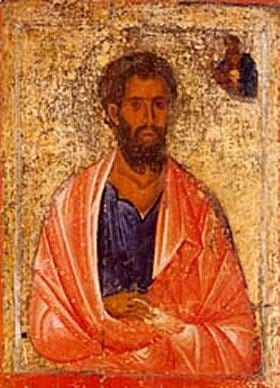
As I explained here recently, I am convinced that James was the “disciple whom Jesus loved,” the one who became head of family, leader of the movement, and dynastic successor to Jesus as next in line of the royal lineage of King David. Jesus died in the year 30 CE and the earliest written records we have of the movement come from the apostle Paul in the early 50s AD–twenty years later. The historian John Dominic Crossan has called these twenty years the “dark age” of the Jesus movement in that we have no surviving records from those crucial years. What little we know is based on attempts to try to read back what we might possibly construct from later materials–namely the Synoptic Gospels, John, and the book of Acts–all of which are late compositions, heavily influenced by Paul and his visionary based Gospel. These texts become the “standard narrative” and James is pretty much written out of the story, see my post on getting the New Testament “James” straight here. Given the dominance of these texts in the New Testament it becomes difficult to even imagine how vital James was to the survival and development of the movement in those first critical decades.
I am convinced that the earliest followers of Jesus and John regained their faith and resolve following Jesus’ crucifixion not by a spirit of ghost of Jesus appearing to them, nor by experiences of the resuscitated corpse of Jesus coming to life and living among them, passing through walls, and finally rising up bodily into the clouds into heaven, but by the living presence of James the beloved brother of Jesus.
It was the spirit that James must have reflected and exhibited in those dark days of danger and disappointment, when the scattered followers migrated back to Galilee after the Passover week ended, that would have held them together. I realize this is quite an alternative to the later “Easter story,” as I have explained here and here, but this is the picture presented by our earliest independent sources.
To have James with them was akin to having Jesus with them. In terms of historical explanations I think this one makes the most sense and it was James who led the group back to Jerusalem for the feast of Pentecost or Shavuot, 50 days after Jesus’ death, where they really began to consolidate things and found a new direction and hope for the expectation of the Kingdom of God to which they had dedicated their lives. Their faith was focused on the “coming of the Son of Man in the clouds of heaven” based on their understanding of Daniel 7:13, which for them meant the “saints of the Most High” receiving “dominion, glory, and kingship that all peoples, nations, and languages” would serve them (Daniel 7:13-14 as interpreted in verse 27).
The book of Acts quite deliberately mutes the vital role of James, listing the presence of the remaining Eleven apostles in Jerusalem and then adding, in passing, that “Mary the mother of Jesus, as well as his brothers” were there as well (Acts 1:14). Peter and the fishermen James and John take center stage in Acts and Jesus’ brothers, including James, go unnamed.
It is only at the critical Jerusalem Council meeting (c. 50 CE), when the unity and survival of the entire movement hung in the balance, that the author of Acts, quite reluctantly, and without fanfare, has to acknowledge that none other than “James” (whom he does not even bother to identify as Jesus’ brother!) presided over the group, declared his “decision,” while both Peter and Paul stood before him in audience (Acts 15:13-21). If all we had was Luke-Acts we would not even know Jesus had a brother names James who assumed leadership of the movement. The same is true of all three of our Synoptic gospels. James’ place and role is written out of the story and that is why most non-academics, and even pew sitting Christians today have no idea he even existed–unless they have somehow picked up on all the publicity surrounding the “James son of Joseph, brother of Jesus” ossuary inscription.
One speculation I find appealing is the idea that James somehow reminded the shattered group of Jesus. Whether they were very similar in looks, voice, outlook, and personality we will never know, but somehow, after Jesus was dead and buried, the community found solace in the physical presence of James. Perhaps he was the mysterious figure on the shores of the sea of Galilee whom they had trouble recognizing, or the one who appeared to them on a mountain in Galilee, leaving some “doubting” (John 21:4-14; Matthew 28:16-17). This would also mean he is the “witness” cited by the final editors of the appendix to the gospel of John (21:24).
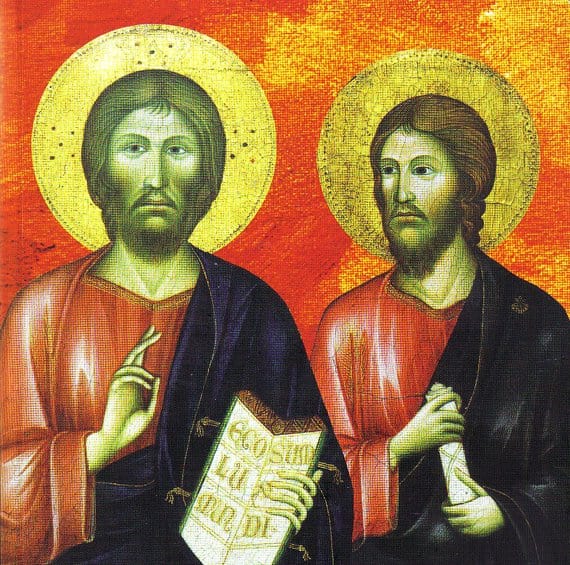
In gathering around James it was as if the spirit of Jesus was still among them in the person of his brother. I have wondered whether the original idea now embedded in latter part of the gospel of John, about the “Helper” (better translated as Guide) coming, was originally referring to James:
And I will ask the Father, and he will give you another Guide, to be with you forever (John 14:16)
But the Guide, the Holy Spirit, whom the Father will send in my name, he will teach you all things and bring to your remembrance all that I have said to you (John 16:26)
“But when the Guide comes, whom I will send to you from the Father, the Spirit of truth, who proceeds from the Father, he will bear witness about me (John 15:26)
Nevertheless, I tell you the truth: it is to your advantage that I go away, for if I do not go away, the Guide will not come to you. But if I go, I will send him to you (John 16:7)
The Greek word is Paraklete/παρακλητος, and refers to one who represents, advocates, helps alongside, leads, or guides. It is true the text personified this one in John as “the Spirit of Truth,” but “he” is spoken of in a very personal way, in the masculine gender, very much as one would speak of a person. Jesus says of this one that he will be “sent in my name,” and that he will be a Teacher who will remind the community of all that Jesus has taught them. The Ebionites held the view that what they called the “Christ Spirit” had “hastened through the ages” and rested upon various ones in a successive way from generation to generation. In this view the “Spirit of Truth,” that Jesus received at his baptism, making him the “anointed of the Spirit,” was passed on to James his brother. This idea, of the “anointed of the Spirit,” is based on Isaiah 61:1, a text that both Jesus followers and earlier, the Dead Sea community, had focused upon, as I recently discussed here. Jesus told them that this one “abides with” them and will be “among” them. This one will “not speak on his own, but will speak whatever he hears, and he will declare to you the things that are to come.”
Indeed, when you compare the teachings of Jesus in our earliest source and the teachings of James, the parallels are quite striking, notice:
Jesus’ Teachings in the Q Source | Teachings of James |
| “Blessed are you who are poor, for yours is the kingdom of God (Luke 6:20) | “Has not God chosen the poor to be rich in faith and heirs of the kingdom” (2:5) |
| “Whoever relaxes one of the least of these commandments . . . shall be [called] least in the kingdom” (Matthew 5:19) | “Whoever keeps the whole Torah but fails in one point has become guilty of it all” (2:10) |
| “Not everyone who says ‘Lord, Lord’ shall enter the kingdom . . . but he who does the will of my Father” (Matthew 7:21) | “Be doers of the word and not hearers only” (1:22) |
| “How much more will your Father . . . give good gifts to those who ask him” (Matthew 7: 11) | “Every good gift . . . coming down from the Father” (1:17) |
| “Woe to you that are rich, for you have received your consolation” (Luke 6:24) | “Come now, you rich, weep and howl for the miseries that are coming upon you” (5:1) |
| “Do not swear at all, either by heaven for it is the throne of God, or by earth for it is his footstool . . . let what you say be simply ‘Yes’ or ‘No’” (Matthew 5:34, 37) | “Do not swear, either by heaven or by earth or with any other oath but let your yes be yes and your no be no” (5:12) |
Paul’s emphasize on his visionary apparitions or “appearances” of the heavenly “Christ,” come later by several years. The Galilean based group of Jesus followers must have found a way to sustain themselves and express their faith in Jesus as one whom God had exalted to heaven long before Paul showed up on the scene with his unique claims to be a “thirteenth” Apostle on a par with those who had known Jesus personally and were chosen by him.

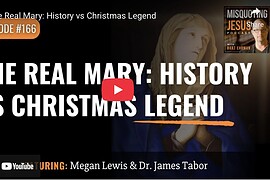

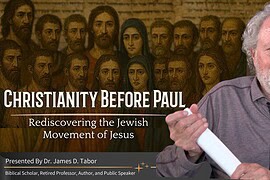




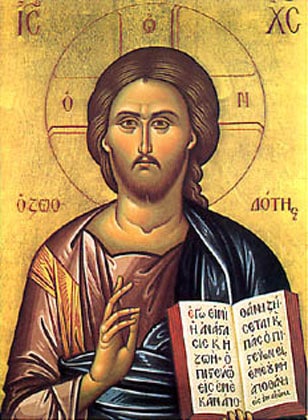
Comments are closed.